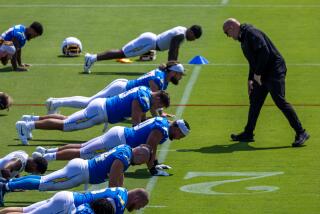Redskins’ Training Camp Admission Charge: an NFL Trend?
- Share via
ASHBURN, Va.-Anita and Gaylon Moomaw weren’t thrilled when Washington Redskins owner Daniel Snyder became the first to charge fans to watch summer practice.
Training camp opened on the Moomaws’ 49th wedding anniversary, so they went anyway - filled with skepticism and memories of when the Redskins’ summer practice provided an inexpensive outing for the family.
They left admitting that a day at the brand-new training complex was probably worth the price.
“There’s not a whole lot that’s free anymore,” Anita Moomaw said. “We had a nice time.”
Though many clubs say they wouldn’t dream of running the risk of embittering fans for a limited amount of revenue, others say that if the Redskins can satisfy people like the Moomaws and still make money, teams throughout the National Football League will quickly follow suit.
“Somebody had to go first,” said Dean Bonham, president of the Bonham Group, a Denver-based sports-franchise consult firm. “The Redskins are taking a big risk with the negative publicity and possible alienation of their fans. If it works though, you can rest assured it will become a leaguewide trend overnight.”
The team began charging admission after Snyder paid $1 million to break a contract and move camp to the Washington suburb of Ashburn, Virginia, from the western Maryland town of Frostburg.
It’s one of several dramatic changes to a once-staid franchise made by Snyder, who paid a record $800 million to buy the team last year.
The Redskins opened camp July 20, with an estimated 4,000 fans attending the morning and afternoon practices combined.
$10 Admission
Tickets cost $10 for adults and children over the age of 12. With that, fans gain admission to the $2 million complex of practice fields and such fan amenities as a children’s activity area.
The Redskins wouldn’t disclose how much revenue they expect to generate during the six weeks of camp, although they said they hoped it would pay for the training complex.
Turnout the first week fell short of expectations. The first weekend practice that was open to the public drew about 6,000 fans, even though staff was prepared to handle as many as 15,000.
“We believe we’ve delivered tremendous value to the fans here,” team President Steve Baldacci said. “The kids are laughing and dancing. This is a success.”
Shortly after the Redskins disclosed their intentions of charging admission for training camp, executives for the Super Bowl champion St. Louis Rams addressed the idea, too.
“We thought about it,” said Bob Wallace, the Rams’ general counsel. “We just wanted to see what the reaction was in Washington.
“If they are able to market this and it goes over well, I think you could see it developing into a trend. Teams are always looking for ways to generate additional revenue.”
The Redskins will sell tickets to 30 practices this summer. The more fans attend, the more the team can charge sponsors to display banners and advertisements around the field, too.
The team also charges $10 to park and sells food and Redskins merchandise: a hot dog was $5, a woman’s tank top was $30, and a men’s colored Redskins shirt was $74.99.
Though the practice of selling access to training camp could be even more lucrative - with teams charging fans to watch videotaped workouts on the Internet or for autographs or pictures with players, cheerleaders and mascots - many teams defend the traditional practice of making workouts free and open to the public.
“We don’t see camp as a revenue-generating tool,” said Pittsburgh Steelers spokesman Ron Wahl. “We see it as an opportunity for all the people who can’t get tickets for the regular season to come out and get close and personal with the players.”
The New Seat License?
This isn’t the first seemingly rogue revenue-generating idea that became accepted.
When the Carolina Panthers franchise was awarded in October 1993, the club said it planned to sell the right to buy tickets to raise revenue for a stadium. Many NFL owners sneered at the idea of “personal seat licenses,” which effectively require fans to pay twice for tickets - once for the right to buy them, then for the tickets themselves.
Art Modell, owner of the Cleveland Browns at the time, was among them. “I have about as much chance of selling them in Cleveland as you have of building an igloo. It will never happen.”
The Panthers sold more than 60,000 seat licenses, generating $115 million toward construction of their $185 million stadium.
The concept later was used to generate money for new stadiums in St. Louis, Oakland, Tennessee, Cincinnati and Pittsburgh. Modell moved his team to Baltimore, and the Ravens’ new stadium was partially funded by them, and they were used to raise money for the new Cleveland Browns’ field.
Training camp admission might be just a 2000 version of personal seat licenses.
“The Redskins are taking a big risk, but there is an awful lot working in their favor, including the popularity of the NFL and the incredible appetite of sports fans,” Bonham said. “ I think there will be a high level of interest. This could really work.”
As practice began, the Moomaws, Anita, 69, and Gaylon, 72, of Alexandria, Virginia, sat in the stands watching their favorite players and talking about the team’s potential for the upcoming season. They were enjoying themselves.
“We’ve been Redskins fans for most of our lives,” Anita Moomaw said. “We thought this would be a great place to celebrate.”
More to Read
Go beyond the scoreboard
Get the latest on L.A.'s teams in the daily Sports Report newsletter.
You may occasionally receive promotional content from the Los Angeles Times.










